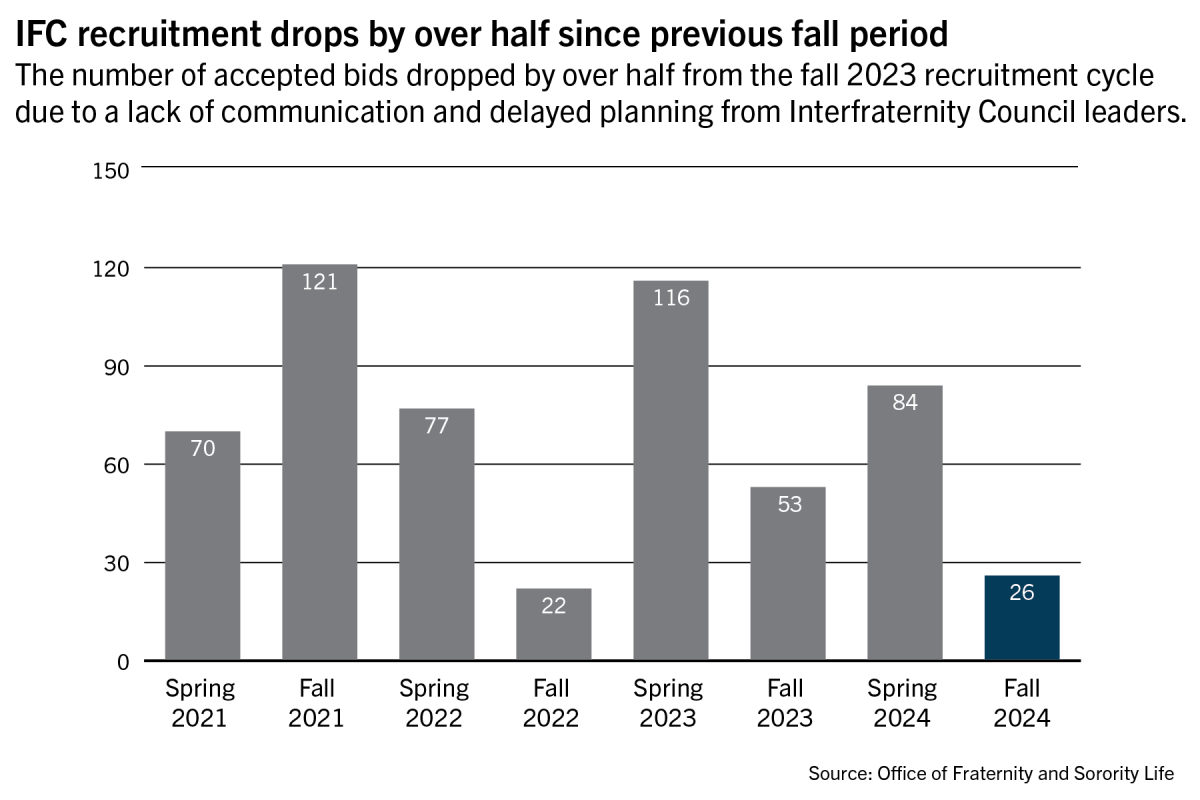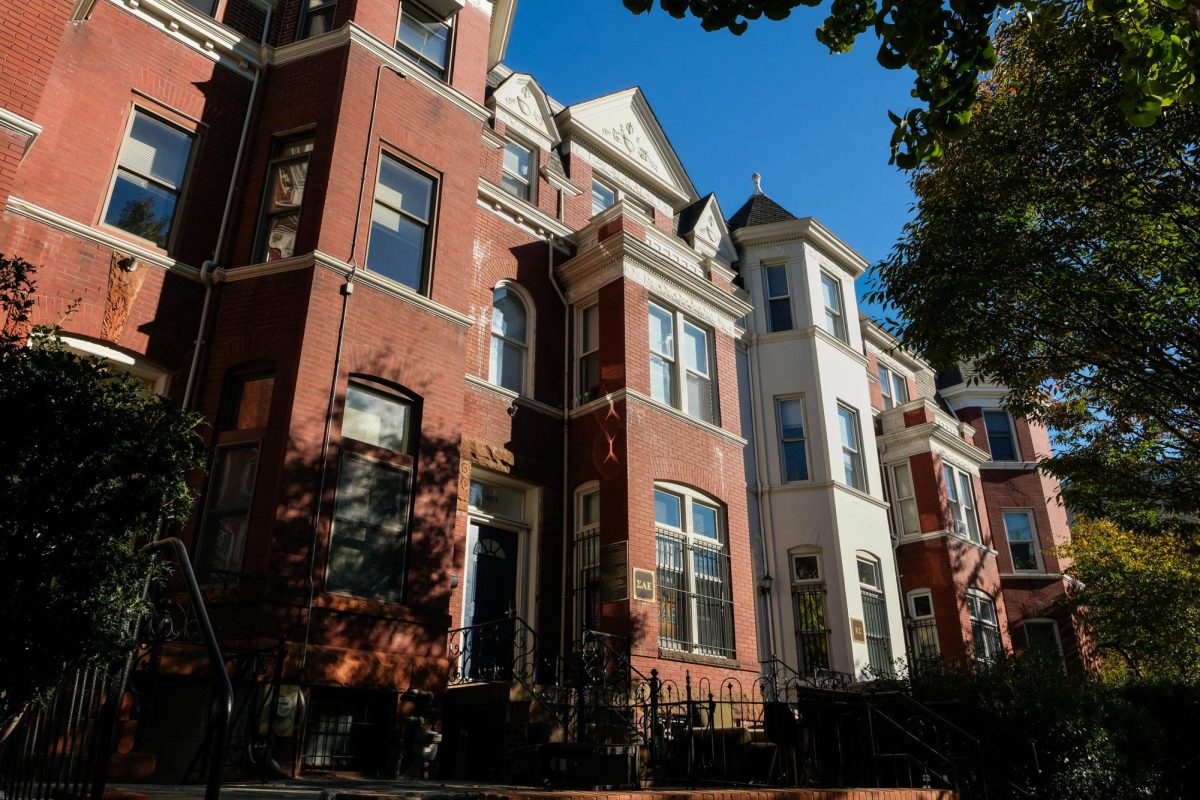Updated: Oct. 25, 2024, at 11:02 a.m.
Fraternity fall recruitment numbers declined this semester, which some members attributed to delayed programming schedules from Interfraternity Council leaders and a lack of communication between chapters and IFC leaders.
Out of the 51 students who participated in fall recruitment, 26 students accepted membership offers during the fraternities’s biannual recruitment process last month — roughly half the number of new members compared to last year. Leaders of some IFC chapters said the council was disorganized while booking campus spaces and scheduling events for potential new members, which thwarted smaller fraternities’s ability to recruit more new members.
Last year, 53 out of 98 students registered for recruitment accepted bids, more than double the amount from fall 2022 when numbers plummeted to 22 from 121 the previous year. Officials said last year’s uptick in new members was a symptom of a return to pre-pandemic engagement after recruitment participation declined during COVID-19.
Assistant Dean of Student Life Brian Joyce said Alpha Epsilon Pi gained five new members and Beta Theta Pi, Delta Tau Delta and Sigma Chi each gained three. He said Kappa Sigma gained eight new members and Zeta Beta Tau gained four. Phi Gamma Delta, Sigma Alpha Epsilon and Tau Kappa Epsilon did not take on any new members, Joyce said.
Joyce said the decline in accepted bids is due to potential new members not completing requirements to receive a bid, like meeting a 2.0 GPA, attending mandatory recruitment events or registering for recruitment as a first-semester student.

Senior Chris Hoang, the recruitment chair of FIJI, said working with the IFC for recruitment has been “messy” because of consistent lack of communication between the council leaders and chapters, changing rooms for events “last minute” and unclear instructions on how to use Campus Director, a website that chapters use for recruitment.
IFC President Henry Lau and Jonny Thibodeau, the IFC’s vice president of recruitment, did not return requests for comment.
“Overall, I think it has been a pretty big mess with last-minute changes,” Hoang said. “I don’t really have anything to say about them that I think that really went well.”
Hoang said he doesn’t depend on the IFC and the formal recruitment schedules because there can be “chaotic changes” that can upend recruitment. He said his chapter has gained four new members throughout FIJI’s recruitment efforts this semester, though Joyce said the organization did not take on any new members.
Hoang said FIJI recruited their four new members outside of the formal recruitment period, and hadn’t yet registered the members with FSL. He added that the fraternity recently submitted the new members to FSL and are continuing to recruit new members.
Hoang said his chapter recruits year-round to allow students to join the fraternity outside of the formal recruitment periods, which provides more flexibility to work with students’s schedules. Hoang said FIJI expanded outreach by reaching out to students on campus who may not be interested to encourage them to join recruitment. The chapter recruited no new members last fall.
“We’re not inflexible, we’re not stuck within that formal recruitment week,” Hoang said. “We like to recruit for the entire semester or the entire year, and we find more success in that than, rather than sticking to the formal recruitment schedule.”
FIJI, which is entering its third year on campus, is petitioning to receive their charter and become recognized within their national organization. The fraternity was supposed to attend the FIJI national convention this August but could not make it due to scheduling conflicts, Hoang said. He added that the organization will be working to obtain its charter later this year or in the spring semester.
AEPi took on five new members last month, matching its numbers from last year’s recruitment. AEPi President Aidan Rosenblum said smaller fraternities didn’t rely on the IFC for advertising fall recruitment because there were “minimal” promotions from the IFC like flyers and announcements for this semester’s process.
Rosenblum said the IFC waited too long to finalize recruitment plans like meeting times and locations, giving five days’ notice for chapter members, which caused scheduling conflicts for members of AEPi. He added that “a lot” of the potential new members already know which fraternities they want to join because they have friends in specific organizations.
“It’s hard to rely on the IFC, when there’s little recruitment efforts being made throughout campus,” Rosenblum said.
Rosenblum said AEPi reaches out to Jewish students through mutual connections and makes informal relationships in community and personal spaces by hosting events that expand the fraternity’s presence on campus.
“We provide a community that is comfortable to many others because it’s what they’ve either, you know, grown up in. It’s an extension of home relief for a lot of guys,” Rosenblum said.
Sigma Chi President Jack Prisendorf, a junior, said the chapter gained three new members, a decrease from the nine they received last year. He added that it’s “normal” for Sigma Chi to receive fewer new members during fall recruitment because they receive most of their new members in the spring when first-year students are permitted to go through recruitment after taking 12-credit hours, per GW’s requirement.
Sigma Chi gained 12 new members last spring.
“The past two years have been like this, where each chapter will end up getting like four or five kids,” Prisendorf said. “But the big cycle spring one, and that’s where groups hope for 20 new members.”
Prisendorf said he would like to see more advertisements for recruitment because recruitment was less successful than last year for all fraternities. He said the Office of Fraternity and Sorority Life is helpful with sending recruitment information in newsletters and reserving spaces for the chapters during the processes.
Prisendorf said chapters advertise for IFC recruitment as a whole to give each fraternity a “fair chance” at recruiting new chapter members. He added that chapter members encourage people they meet on campus to go through the recruitment process and get to know every IFC chapter.
“They’re really already bonding well with our existing members, and it’s just a big passion overall,” Prisendorf said. “So I think this is the happiest our group has been in a long time about new member class.”
Joyce said GW’s chapter of Alpha Sigma Phi closed last semester due to the pandemic hindering its long-term membership numbers. He said the University is in “discussions” with Alpha Sigma Phi headquarters about potentially re-establishing a GW chapter in the future. Alpha Sigma Phi did not receive any new members during the previous two fall recruitment processes or in last spring’s recruitment period.
“The decision was made to close the chapter to allow members to prioritize their academic commitments as GW students,” Joyce said.
This article was updated to clarify the following:
This story was updated to include that FIJI had not yet registered newly recruited members IFC, creating a discrepancy between their recruitment numbers.





